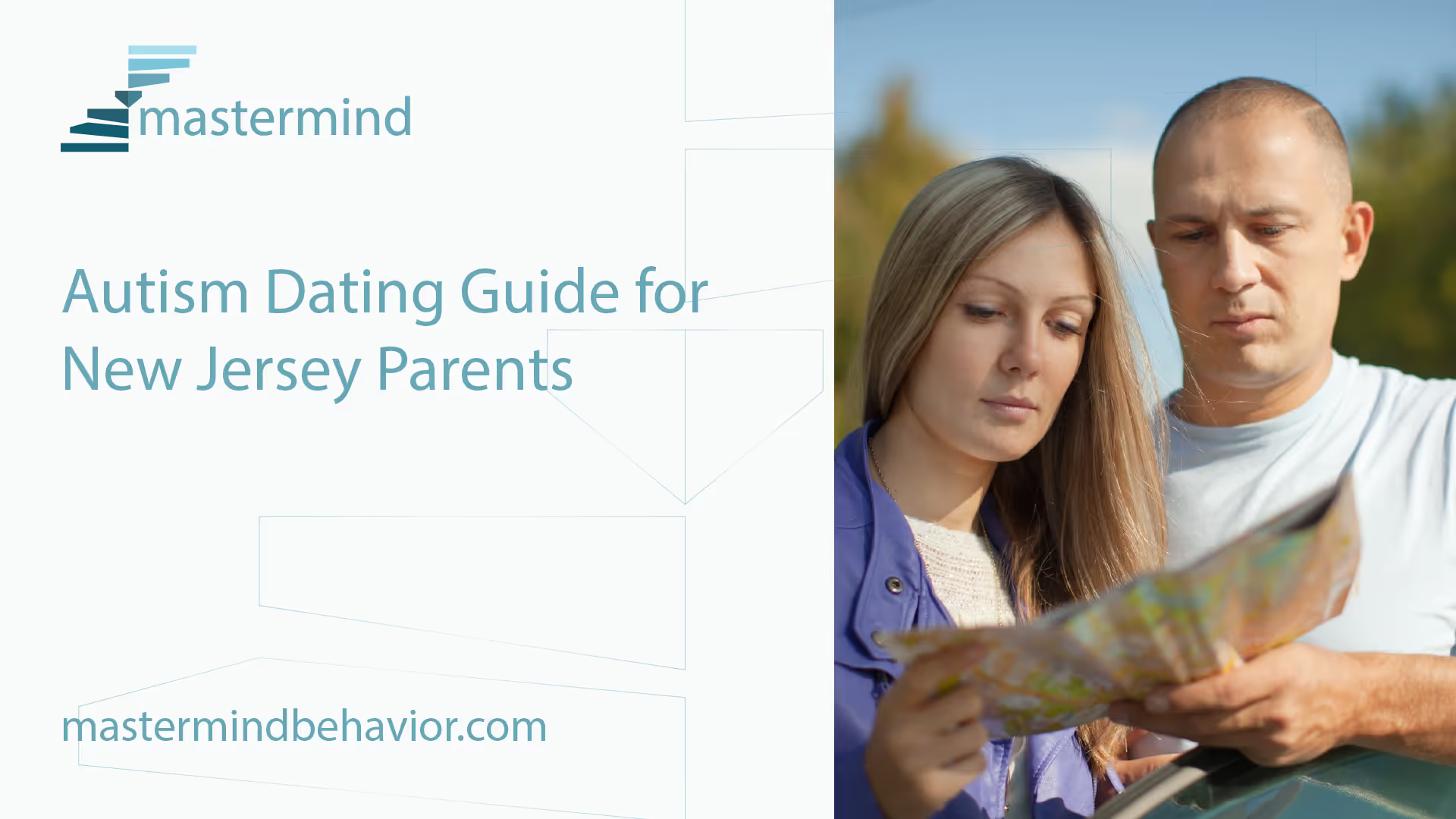Autism Dating Guide for New Jersey Parents

Understanding Autism and Dating
When discussing the realm of dating for individuals with Autism Spectrum Disorder (ASD), it's crucial to lay down the framework for understanding and acceptance, while also acknowledging the unique challenges that such individuals may face.

Autism Inclusivity and Acceptance
Autism inclusivity involves accepting, understanding, and including individuals with autism in all aspects of life, such as education, employment, and community involvement. The goal is to provide them with equal opportunities and promote their well-being.
Why is this so important? It's because inclusivity helps individuals with autism reach their full potential, contribute to society, and improves their quality of life. By offering necessary support, accommodations, and resources, we can create a society that appreciates the uniqueness of every individual and provides opportunities for everyone to thrive.
Inclusive practices also help promote greater awareness and understanding of autism among the general public. This leads to reduced misconceptions and stereotypes and fosters a more compassionate and empathetic society.
Remember, autism is prevalent in our society, with one in 54 children in the United States diagnosed with ASD, according to the Centers for Disease Control and Prevention (CDC) [1].
Challenges in Dating for Individuals with Autism
Navigating the dating world can be challenging for individuals with autism. This is because they may face unique issues such as difficulties in communication, sensory overload, and transitions between activities.
For instance, they may have trouble expressing emotions, leading to misunderstandings or misinterpretations in a dating scenario. Sensory overload, due to heightened sensitivity to stimuli, might make certain dating environments, such as a crowded restaurant or a noisy concert, uncomfortable.
Furthermore, individuals with autism often rely on routines and structures. Hence, the unpredictable nature of dating, with its variable dynamics and transitions between different stages (like moving from online chatting to a real-life date), might pose additional challenges.
However, none of these challenges are insurmountable. With proper understanding, acceptance, and support, individuals with autism can successfully navigate the world of dating, building meaningful connections along the way. The following sections will delve deeper into practical strategies and tips for dating when you or your loved one has autism.
Navigating Dating for Autistic Individuals
The dating landscape can be complex to navigate, especially for autistic individuals. However, with the right guidance and support, it can be an enriching experience. This section will discuss aspects of online dating for autistic individuals, building safe relationships, and provide dating tips.
Online Dating for Autistic Individuals
Online dating can offer a platform for individuals on the autism spectrum to navigate potential romantic relationships with less social pressure. Autistic individuals, especially those with high functioning autism, may find online dating or participating in double dates with trusted friends appealing. It's essential to educate them about online safety and establish safety protocols to protect them [2].
Dating websites and apps can facilitate connections based on shared interests and compatibility, providing a comfortable environment for communication and interaction. However, it's crucial to prioritize safe interactions, boundaries, and limits to ensure a positive experience. Parents and caregivers should monitor these platforms and guide their children on proper internet etiquette and privacy concerns.
Building Safe Relationships
Building safe and meaningful relationships is a significant aspect of the autism dating journey. Enrolling autistic individuals in various events, groups, and community activities based on their strengths and interests can provide them with opportunities to practice social skills and meet others with shared interests [3].
Role-playing, creating scenarios, and practicing social interactions are effective strategies in helping individuals with autism build and maintain connections. Behavior Skills Training (BST) involving giving instructions, modeling, practice, and feedback is commonly used in groups. These strategies can guide autistic individuals on how to initiate conversations, interpret body language, and express emotions appropriately, fostering safe and healthy relationships.
Dating Tips for Autistic Individuals
Dating can be a stepping stone towards personal growth and emotional maturity for autistic individuals. The hit reality show Love on the Spectrum uses the PEERS® program to guide young autistic adults ahead of their dates, enhancing their relational skills and confidence in the dating world. This program is implemented in over 35 countries.
Here are some practical tips for autistic individuals venturing into the dating world:
- Identify personal interests to connect with like-minded individuals.
- Practice social skills through role-play and guided scenarios.
- Learn to express feelings and emotions appropriately.
- Remember that it's okay to take things slow and communicate comfort levels.
- Always prioritize safety, especially in online dating.
- Be open to feedback and learn from experiences.
These strategies offer guidance for autistic individuals to partake in the dating world confidently and safely. With the right support, they can navigate this journey successfully, fostering meaningful relationships along the way.
Relationship Dynamics with Autistic Partners
Dating and relationships involve complex emotions and interactions, which can be particularly challenging for individuals with autism. This section explores the dynamics of relationships involving autistic individuals, focusing on communication challenges and strategies, understanding emotional expression, and promoting empathy and understanding.
Communication Challenges and Strategies
Communication is a key aspect of any relationship, and it presents unique challenges and opportunities when one or both partners are autistic. Autistic individuals often prefer direct and literal communication, rather than subtle hints or sarcasm. This tendency stems from their difficulty in reading between the lines or interpreting non-verbal cues. Misunderstanding can arise when neurotypical partners communicate in a way that may seem obvious to them but is not clearly understood by their autistic partners. Hence, neurotypical partners should strive to offer clear communication to avoid miscommunication and rejection.
In addition, neurotypical partners may feel frustrated with the perceived lack of attention and intimacy from their autistic partners. It's crucial to recognize that autistic individuals may have a history of being misunderstood and may go into fight or flight mode when they sense rejection or conflict. Thus, direct communication and understanding can help bridge this gap.
Understanding Emotional Expression
Autistic individuals often struggle with emotional blindness, meaning they have difficulty reading other people's emotions. This can lead to misunderstandings and hurt feelings within the relationship. On the other hand, autistic individuals can be very empathetic, sometimes to the point of feeling intense emotions. However, they may struggle to express emotions on their face or have difficulty verbalizing them, leading to the misconception that they cannot feel or express emotions.
Neurotypical partners can help by communicating their feelings and needs directly, thus reducing the chances of misinterpretation. It's also important to remember that the absence of traditional emotional expressions does not equate to a lack of feeling or empathy. Patience, understanding, and open dialogue can help both parties navigate these challenges.
Promoting Empathy and Understanding
Promoting empathy and understanding in a relationship involving an autistic partner is important. By accepting and understanding each other's emotions and experiences, partners can improve communication, foster emotional intimacy, and meet each other's needs more effectively in the relationship. This requires effort from both individuals, with neurotypical partners making an effort to understand the unique challenges faced by their autistic partners, and autistic partners striving to communicate their feelings and needs clearly.
In conclusion, autism dating involves unique dynamics and challenges. However, with understanding, patience, and effective communication, individuals with autism and their partners can build fulfilling relationships.
Supporting Autistic Individuals in Dating
Navigating the dating world can be challenging for anyone, but it can be especially daunting for individuals with autism due to difficulties in interpreting subtle social cues and non-verbal communication from their partners. Therefore, supporting autistic individuals in their dating journey through social activities, skill-building exercises, and technology can help them establish and maintain meaningful relationships.
Enrolling in Social Activities
Caregivers can play a vital role in the dating journey of autistic individuals by enrolling them in various events, groups, and community activities based on their strengths and interests. These opportunities not only provide them with a platform to practice social skills but also allow them to meet others with shared interests, fostering meaningful relationships. Programs like the internationally acclaimed PEERS® for Adolescents and Young Adults offer a structured environment to learn various skills such as making friends, finding common interests, initiating and ending conversations, handling teasing and bullying, managing disagreements, and various aspects of dating like flirting, asking someone out, consent, safety, and dating etiquette [3].
Role-Playing and Social Skills Practice
In addition to real-world social interactions, role-playing and practicing social interactions can be effective strategies in helping individuals with autism build and maintain meaningful connections with others. Behavior Skills Training (BST), which involves giving instructions, modeling, practice, and feedback, is commonly used in groups to support the development of social skills. By creating scenarios and practicing responses, autistic individuals can gain confidence and learn how to handle various social situations, including those related to dating.
Utilizing Technology for Social Interactions
Technology has opened up new avenues for individuals with autism to navigate social interactions and relationships. Virtual groups can assist them by allowing participation from home, reducing social pressures, and providing access to group options and social events for practicing social skills. These platforms can be especially beneficial for those who may feel overwhelmed by in-person social interactions. By gradually increasing their exposure to social situations in a controlled environment, autistic individuals can develop their social skills and prepare for in-person dating experiences.
These strategies can provide a supportive framework for autistic individuals as they navigate the world of dating. By fostering an environment that encourages their social growth and understanding, caregivers can help them build meaningful relationships while respecting and appreciating their unique ways of experiencing the world.
Diverse Relationship Styles for Autistic Individuals
There is a broad spectrum of relationship styles that autistic individuals may find more conducive to their unique needs and preferences. These can vary significantly from neurotypical norms, emphasizing the importance of understanding and acceptance in the realm of autism dating.
Tailoring Relationships to Individual Needs
For many autistic people, non-traditional styles of relationships may suit them better than the neurotypical model of dating, monogamy, cohabitation, commitment, and children. This could include relationships involving living separately, platonic relationships, romantic relationships that are not sexual, single parenting, non-monogamous relationships, or participation in specific subcultural groups. These relationship styles enable autistic individuals to tailor their relationships to their needs, desires, and capabilities, reflecting their tendency to pursue authenticity over social norms.
Requesting Relational Accommodations
Autistic individuals often emphasize the importance of asking for what they need in relationships, including requesting relational accommodations that cater to their disabilities. This approach involves letting go of arbitrary standards and focusing on functional communication to express satisfaction and ensure happiness for both partners. While it's crucial to ask for what they need, autistic individuals also understand the importance of accepting when their requests may not align with a partner's compatibility.
Communication Strategies in Relationships
Autistic people exhibit communication skills that may differ from those of neurotypical individuals. While guidance on communication typically targets neurotypicals, it may not suit autistic individuals, leading to feelings of overwhelm, discomfort, or incapability. Relational accommodations around communication become particularly important in relationships involving autistic individuals. This may include utilizing non-verbal communication and setting time limits for complex conversations. These strategies may differ from neurotypical norms but contribute to maintaining safety and happiness in relationships.
Navigating relationships can pose significant challenges for autistic individuals. It often prompts continual unlearning of ableist ideas, self-discovery, and acceptance of autistic differences. By embracing these differences, individuals find themselves happier in relationships that may not conform to neurotypical ideals. This journey involves understanding oneself, what feels right, and challenging societal norms to create fulfilling relationships.
Autistic individuals often invest an intense amount of time and energy into their relationships, similar to their focus on special interests. They might feel strongly about their love life just as they do about their passions. Understanding and respecting these diverse relationship styles and communication strategies can greatly improve the dating experience for autistic individuals and their partners.
References
[1]: https://www.goldencaretherapy.com/autism-inclusivity/
[2]: https://www.autismparentingmagazine.com/honest-dating-autistic-people/
[3]: https://kinarkautismservices.ca/autism/love-beyond-neurotypicality-how-to-support-young-adults-on-the-spectrum-in-the-dating-world/
[4]: https://opendoorstherapy.com/autism-acceptance-neurotypical-partners/
[5]: https://opendoorstherapy.com/dating-on-the-autism-spectrum-notes-for-neurotypical-partners/
[6]: https://reframingautism.org.au/divergent-love-navigating-love-and-relationships-as-an-autistic-adult/
Recent articles

How Collaborative Care Models Enhance ABA Therapy Outcomes
Transforming ABA Therapy Through Unified, Multidisciplinary Approaches

How ABA Therapy Supports Academic Success for Children with Autism
Unlocking Potential: How ABA Drives Academic Achievements in Children with Autism

How Community-Based ABA Therapy Encourages Real-World Skill Application
Bridging Therapy and Daily Life: The Impact of Community-Based ABA

The Importance of ABA Therapy in Strengthening Family Communication
Building Bridges: How ABA Therapy Enhances Family Bonds

How ABA Therapy Can Help Children with Autism Navigate Social Norms
Empowering Social Success: An Insight into ABA Therapy for Autism

Developing a Routine for Children with ASD to Promote Functional Skills
Creating Predictable Daily Structures for Autism Support


